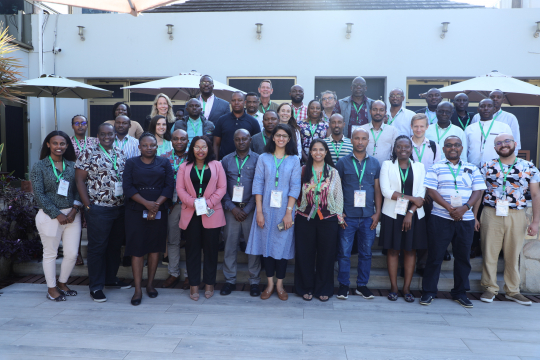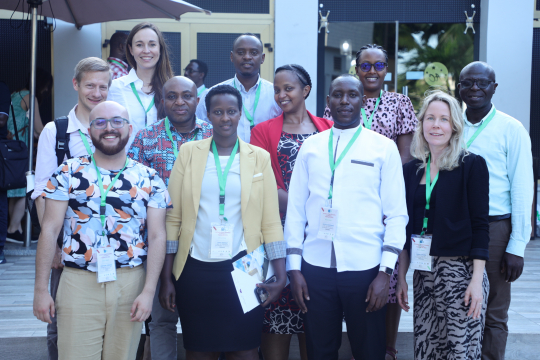In a constructive collaboration, policymakers from Kenya, Tanzania, Uganda, Ethiopia, and Rwanda joined forces with researchers to address the pressing issue of biomass dependency in East Africa.
The workshop, which took place in connection with EfD’s Annual Meeting in Ghana, aimed to bridge the gap between scientific knowledge and policymaking, ultimately striving to reduce biomass dependency in the region.
The workshop, arranged by the Inclusive Green Economy Program (IGE) and the Sustainable Energy Transitions Initiative (SETI), brought together an impressive array of experts, including researchers from SETI, civil servants, climate experts, governmental program coordinators, economists, geologists, and many more, to tackle the critical issue of biomass dependence. The goal was to formulate effective policy solutions that can help East African countries move towards cleaner and more sustainable energy sources.
Aimed to find the root causes
The workshop had two specific aims: for the IGE Program, to support the IGE Fellows (East African civil servants) in finding viable solutions to reduce biomass dependency. For the SETI Collaborative Program, to foster stronger collaborations between researchers and policymakers to address research and policy gaps regarding biomass dependency.
The workshop used a structured method to address the problem. It began with an introduction by IGE and SETI fellows, providing instructions and an overview of the objectives. Afterward, practitioners and researchers created a Problem Tree for biomass dependency. They discussed the effects of biomass dependence in their respective countries, compared their experiences with those of other countries, and delved into the root causes of the problem. Then, teams identified the root causes of biomass dependency in East Africa, focusing on research and policy gaps. Finally, a joint wrap-up discussion facilitated the exchange of common thoughts and outlined potential actions in the region.
Challenges for reducing biomass dependency
While each East African country highlighted unique aspects of its biomass dependency issues, several common themes and challenges emerged from the workshop:
1. Expensive cleaner energy sources: Uganda, Rwanda, Tanzania, and Ethiopia all mentioned the high cost of cleaner energy sources, which affects both households and small businesses. This prevents people from transitioning away from biomass.
2. Cultural norms and gender roles: Uganda and Kenya pointed out the significant influence of cultural norms on biomass dependency. In Uganda, women are more willing to transition to greener energy sources while men prefer traditional cooking methods, contributing to fuel stacking. Kenya highlighted the importance of addressing cultural norms as well as gender impacts.
3. Government policy and commitment: Ethiopia highlighted the poor engagement of the private sector in producing cleaner energy technologies and the lack of government commitment. In Rwanda, the government was actively working on subsidies for cleaner activities, indicating the role of government policies in addressing biomass dependency.
4. Communication and awareness: Kenya emphasized the lack of effective communication to raise awareness about the harm of biomass dependency and promote cleaner energy alternatives. Rwanda also noted the need to raise awareness of the issue in government offices and households. Even high-income households still rely on biomass.
5. Health and environmental effects: Ethiopia and Kenya highlighted health and environmental effects, including air pollution and reduced agricultural productivity, caused by biomass dependency. These effects were common concerns across countries.
6. Access to technology: Tanzania mentioned the importance of investing in infrastructure and technology availability, especially for clean fuels used for cooking. This challenge was identified as crucial for the transition to cleaner energy sources.
7. Poverty and survival: Rwanda and Tanzania recognized that addressing poverty is vital in transitioning to cleaner energy. Poor families often prioritize survival over sustainable cooking practices, making it essential to tackle poverty issues alongside promoting cleaner energy alternatives.
8. Inequality and conflicts: Ethiopia identified biomass dependency as contributing to inequality within the population and increasing civil conflicts. Kenya mentioned community conflicts and insecurity as some of the socioeconomic effects of biomass dependency.
Important address poverty and climate
Innocent Mugabe, the Aid Information Management Officer of the Ministry of Finance and Economic Planning in Rwanda, emphasized the importance of addressing poverty in the population as part of a cleaner energy transition.
"Poor families prioritize to survive so cooking sustainably is not necessarily a priority. Therefore, we need to tackle poverty as we advance towards a cleaner energy transition," he said.
Hana Mekonenn Alemu, Climate Change Expert from the Ministry of Water and Energy in Ethiopia, said more focus should be placed on climatic issues and activities that involve ministries and other government departments.
“I learned new techniques on how to address these issues. Researchers showed the ways to identify and implement policy instruments, especially on biomass dependency,” she said.
Ridhima Gupta, a member of SETI's Steering Committee representing South Asia, noted that the workshop was a great opportunity to learn a lot about different countries, their energy mix, and the constraints for a clean energy transition.
“The policymakers discussed their energy ladders and identified the need for more engagement across countries and between researchers and policymakers," she said.
Ridhima Gupta also noted that “as researchers, we have to understand the needs and constraints of policymakers so we can guide our research to be more productive in addressing the issue of biomass dependency."

